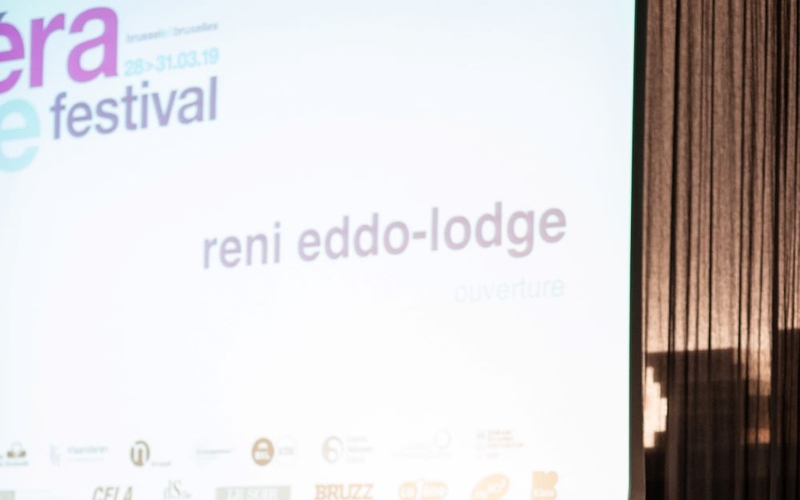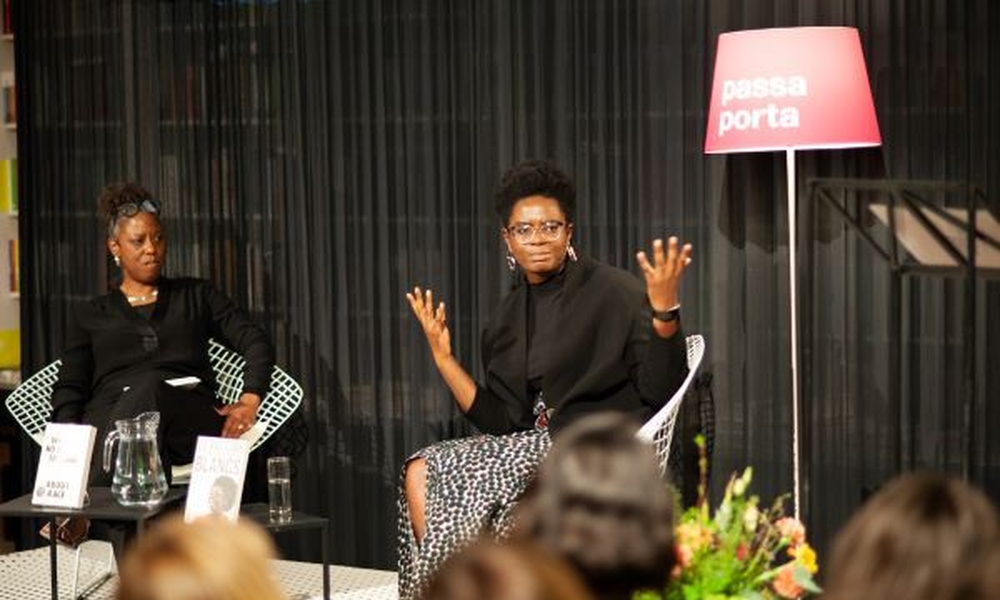An ethereal frankness. Reni Eddo-Lodge at Passa Porta

Both activist Rachael Moore (RainbowHouse and Rainbow Nation Brussels) and artist Isaiah Lopaz (Berlin) attended the opening night of the Passa Porta Festival with Reni Eddo-Lodge on 28 March 2019. We invited them to reflect on the evening. Read Rachael's text below.
"Have you read the book?", says the man behind me to the man next to him.
"No I haven't, well not yet. But I'm not sure I'll like what I'll read from the looks of the title", he replies.
This is how my introduction to the debate with Reni Eddo-Lodge starts. A consistent reminder that I am surrounded by people, white people, who can make these choices. Who have these choices. They can choose to attend this debate just like they can choose to buy Reni's book. Then they can actually choose to read the book and take in the years of work and research Reni has poured into it. Ultimately I would hope the book would, for some, be the or a defining moment when they realise that racism is actually a white problem but… I know better.
Sitting in a room with a majority of white attendees my mind wanders as to the reasons for their attending. My mind makes a quick turn when I pleasantly see the trickle of my melanin rich people enter the room. It's always powerful to see black people support each other.
The lights come on and Reni enters the stage. She speaks with such directness and there is no way around her words. She is bluntly honest with her answers. During the debate Reni touches upon many areas. The subjects she goes into detail on, she does with such ease and a complete placid stance that it’s surprisingly refreshing to listen to. I am taken aback to learn that she's a non-fiction writer who loves reading fiction, which is rather intriguing. I would think that she would draw from the complexity of non-fiction but I suppose fiction gives a level of escape that non-fiction doesn’t abode.
Finding a balance
Of course with her newfound success Reni did struggle to let go of a certain aspects of her anonymity, which for her lies at the basis of her humanity. Reni expresses that her job is that of an author and an observer. If one is interested in her opinion on a particular topic then one should “buy her book” she bluntly but honestly jokes.
Holding on to her humanity and trying to find equity between attending speaking events and anonymity is hard. Not all events are made equal and there are and will be hostile audiences.
People are so quick to rally around particular issues with no broader understanding of the intersectionality that is at play, also without having the will or the ear readily to actively listen to those who are currently suffering.
Worlds colliding
Throughout the debate an underlying acknowledgement of the erasure of histories is spoken on. It is no secret that what is consumed by western society is still predominantly depicted and decided by white people and more specifically white men. Which histories are legitimate and are worthy of attention is decided behind closed doors, at tables very few have access to. Should any people, who differ from white and male characteristics, gain access to these tables they are still very dependant on the other people at the table to be willing to listen and act on their behalf. Look at where it has gotten us.
This thought is never lingering far in my mind when I enter spaces that were never meant for me much like Reni is doing so.
The erasure of histories has led to the dominance of African American histories being told the world over. I don’t say this with malice or spite towards African Americans but this is just the reality we live in. Capitalism has made the African American experience a very lucrative one, which African Americans have yet to cash in on.
African American culture is duplicated and reproduced all for white consumption. This thought is never lost on me. When we talk about racism we tend to look to west, we look to the US where racism is bluntly experienced but not too hard as it still needs to be readily available for consumption. It’s a line that plays around in my mind. The fact that one of the moderators is African-American and the other of Afropean background.
Histories willingly forgotten
When writing this book Reni took the opportunity to speak on the racism experienced by Black British individuals. In the book she focuses on the death of Stephen Lawrence who was a black teenager who was killed because he was black whilst he was waiting at a bus stop in Well Ham, Eltham on 22 April 1993. The issue with this case lay not only in the murdering of a young black man at his prime but at how the case was handled by the police. The case of Stephen Lawrence forced not only the police force but the UK to look at its issues of structural racism. Eventually two of the perpetrators were convicted of murder and the Metropolitan Police Service was found to be institutionally racist. If it wasn’t for the consistent and persistent work of Stephen’s mother Doreen then the truth may never have been known.
This case is a clear example of why histories deem attention. It also lays bare a nation’s understanding of itself.
Reni shared that for the making of the book she had to research many archives which are more often than not remain unknown to the larger public and too the very community it is referring to. Taking inspiration from political flyers from the 60s and 70s, Reni is able to sketch a history of racism in the UK context which is concise and very easy to digest.
As we move on in the discussion I curiously hold my breath when we reach the Q&A section of the debate. During these types of periods, I’m used to the barrage of questions from white people desperately seeking for quick-fix solutions as if the purpose of the books completely missed them. Reni is quick to assert that she does not hold the answers to these questions. That it is inevitably up to white people to deconstruct their own racism but that this still remains a choice. A choice once made cannot be pushed upon black or people of colour to do the emotional unpacking of colonial baggage. This choice must be made willingly and continuously.
How I’m still talking to white people about race
Reni Eddo-Lodge is not like many writers. She leaves me with a greater level of understanding of the human condition regarding black women. Another understanding of what it means to be a successful black woman navigating in this world. Not being forced to choose between the many complexes society inflicts on us. Leaving me with a hunger, a hunger I can manage.
Reni is not a writer looking for fame. She is not seeking approval or recognition as she is well aware she is speaking from a place of authenticity and truth. She does her due diligence when researching and is well aware of the costs at stake. Whilst writing Reni never thinks about the reader. She doesn’t waste time trying to adapt her writing to style of the gaze of the reader. She writes with clarity and an ethereal frankness, which is very much needed in this discussion. This is one of the messages I shall take with me.

